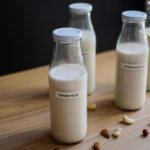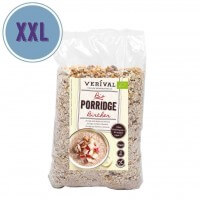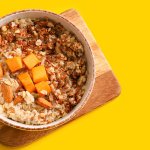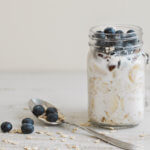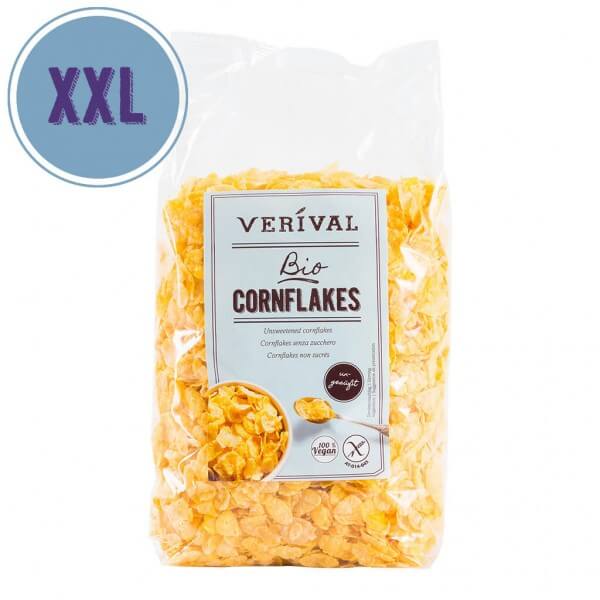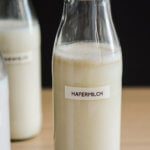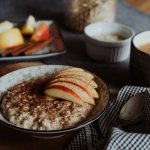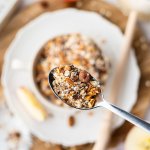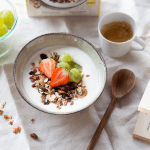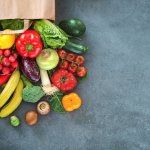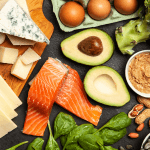Which is healthier: cow’s milk or plant-based drink?
August 18, 2020- Gesund leben
- Healthy lifestyle
- Nutrition
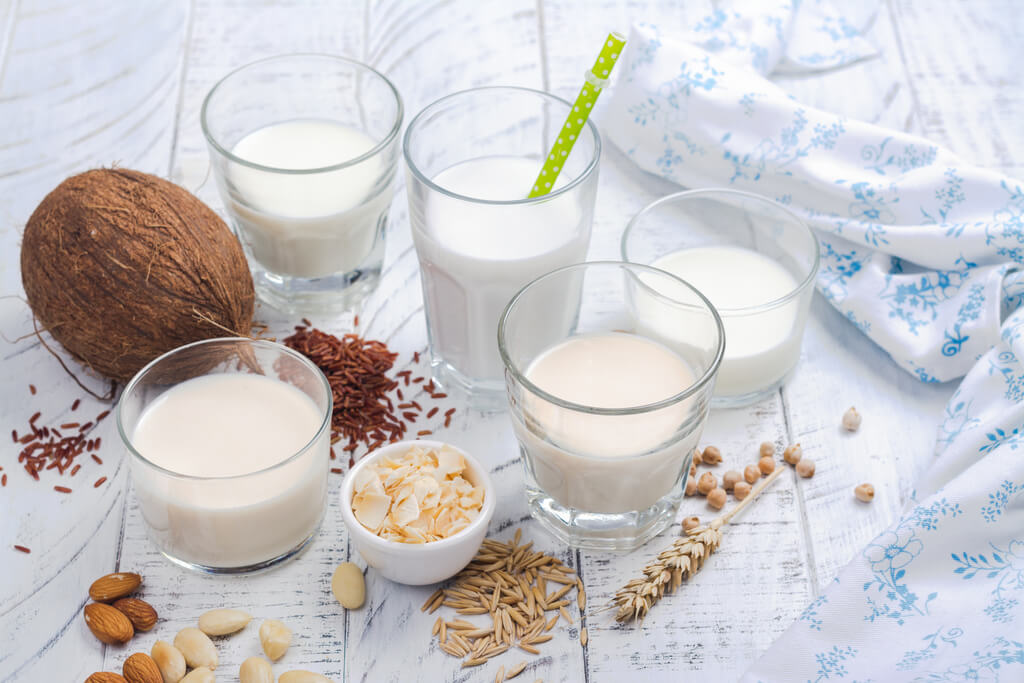
Plant-based drinks are trending at the moment – but is that justified? That’s exactly what we’re going to take a closer look at in today’s blog post. We will not only analyse the plant drinks themselves, but also compare them with classic cow’s milk. In this post, you will find out who performs better in the comparison, what you should look out for and how you can make your own plant drink creations, for example for your porridge.
Übersicht
This is how plant-based drinks are made
In most cases, the raw material – oats, spelt, rice or similar – is soaked in water and then mixed or ground. The remaining lumps or flour residues are then filtered out and the drink is supplemented by the addition of salt, oil and sweeteners. The whole thing is then usually preserved by adding heat, which is why most of the plant-based drinks have a much longer shelf life than cow’s milk, for example.
Unfortunately, the food industry often uses sugar for sweetening. The fact that some plant drink manufacturers use flavourings or stabilisers is also not necessarily optimal. Therefore, it is advisable to regularly reach for the blender yourself and make your own drink – preferably with natural sweeteners such as dates, honey or agave syrup.
The production of plant-based milk alternatives is extremely simple, which is why you can also make your own plant-based drink with a little practice. The main ingredient of the milk alternatives is water, the second main ingredient varies from product to product.
The big nutrient comparison
In order to be able to compare cow’s milk and its alternatives in a meaningful way, we should first take a closer look at the energy content and the nutrients it contains. While a classic whole milk contains about 64 kilocalories per 100 millilitres, plant-based drinks usually have somewhat fewer calories.
However, the plant-based milk alternatives differ considerably in some cases, which is why it is difficult to give a clear number. While some nut drinks only have just over 10 kilocalories, soy milk, which is richer in protein, has 30 to 50 kilocalories per 100 millilitres.
Thus, vegetable drinks are slightly ahead in this comparison – what is really interesting, however, is the content of micronutrients, as these are what make a healthy product.
These nutrients make up cow’s milk
Let’s look at cow’s milk first. A whole cow’s milk has about 64 kilocalories per 100 millilitres – of which proteins and fats each account for about three and a half grams, while carbohydrates are represented by just under five grams.
The fats contained are mainly saturated fatty acids, which should only be consumed in moderation, as they can pose a threat to the cardiovascular system.
Sugar accounts for 100 per cent of the carbohydrates. However, this naturally occurs in milk as so-called lactose, which is why one should not immediately shy away from it. Nevertheless, excessive consumption should be avoided, as one glass of milk can quickly add up to around ten grams of sugar.
However, the protein content should be emphasised, which is quite respectable at around eight grams per glass. The biological value of these proteins is also extremely impressive with a value of 85. As a reminder: the higher the value, the better the protein supplied can be used as building material in the human body.
In addition, milk enjoys a high status as a source of calcium. This nutrient is particularly important for healthy bones and teeth. Furthermore, cow’s milk provides you with some important vitamins such as vitamin A, D and B12.
Almond milk
Ingredients
- 200 g almonds
- 1 tbsp Dates, agave syrup or date syrup for sweetening
- 1 litre water
- 1 pinch of salt
Instructions
- Soak the almonds in a bowl of warm water.
- Leave the almonds covered with water overnight.
- The next day, pour off the water.
- Then put the almonds in your blender with about twice as much water and some sweetener. Also add some salt to make your almond milk last longer.
- Afterwards, sieve the almond milk briefly so that the milk no longer contains any chunks. The best way to do this is to use a nut milk bag through which you squeeze the nut milk over a bowl.
These nutrients characterise plant-based drinks
Plant-based drinks are lower in calories than whole milk. Soy milk, for example, contains an average of just under 50 calories – but the energy content of plant-based milk alternatives varies greatly, with soy milk usually having the highest energy content. Nut drinks, for example, sometimes have less than 20 calories.
The lower calorie content of plant-based drinks is mainly due to the increased content of water and thus a comparatively lower proportion of fats and carbohydrates.
Soy milk, for example, contains only about two grams of fats, most of which are healthy unsaturated fatty acids. The carbohydrate content is also somewhat lower than that of whole milk, at around two and a half grams per 100 millilitres.
The protein content, on the other hand, is almost as high as that of whole milk, at around seven grams per glass. In addition, the high biological value of the proteins in soy milk should be emphasised, which is extremely high with a value of 84.
The micronutrient content of soy milk is also noteworthy. For example, it contains plenty of folic acid and some healthy plant substances such as flavonoids and saponins.
B or D vitamins do not occur naturally in soy milk in significant quantities, but the food industry often supplements it with artificial additions of calcium, vitamin B12 and vitamin D.
Which plant-based drink is the best?
While soy milk differs only marginally from whole milk in terms of nutrient distribution, other milk alternatives sometimes differ greatly. You can get an overview of the different plant-based drinks compared to whole milk in the following table.
| Energy | Carbohydrate | Fat | Of which saturates | Protein | Sugar | |
| Whole milk | 65 kcal | 4.7 g | 3.6 g | 2.4 g | 3.4 g | 4.7 g |
| Soy drink | 39 kcal | 2.5 g | 1.8 g | 0.3 g | 3.0 g | 2.5 g |
| Oat drink | 40 kcal | 6.0 g | 1.4 g | 0.2 g | 0.6 g | 3.8 g |
| Almond drink | 13 kcal | 0.0 g | 1.1 g | 0.1 g | 0.4 g | 0.0 g |
| Spelt drink | 45 kcal | 8.4 g | 1.0 g | 0.1 g | 0.3 g | 5.7 g |
It should be noted, however, that the nutritional values of the individual plant-based drinks vary from manufacturer to manufacturer and can differ considerably in some cases.
Which is healthier?
While classic whole milk stands out due to its high protein content, the amount of calcium and vitamins, it contains unhealthy saturated fatty acids, cholesterol and lactose, which can be problematic, especially for allergy sufferers.
In addition to the health aspects, it should be noted that the ecological balance of cow’s milk is comparatively poor. The greenhouse gases emitted during production are three to four times higher than those emitted during the production of plant-based drinks.
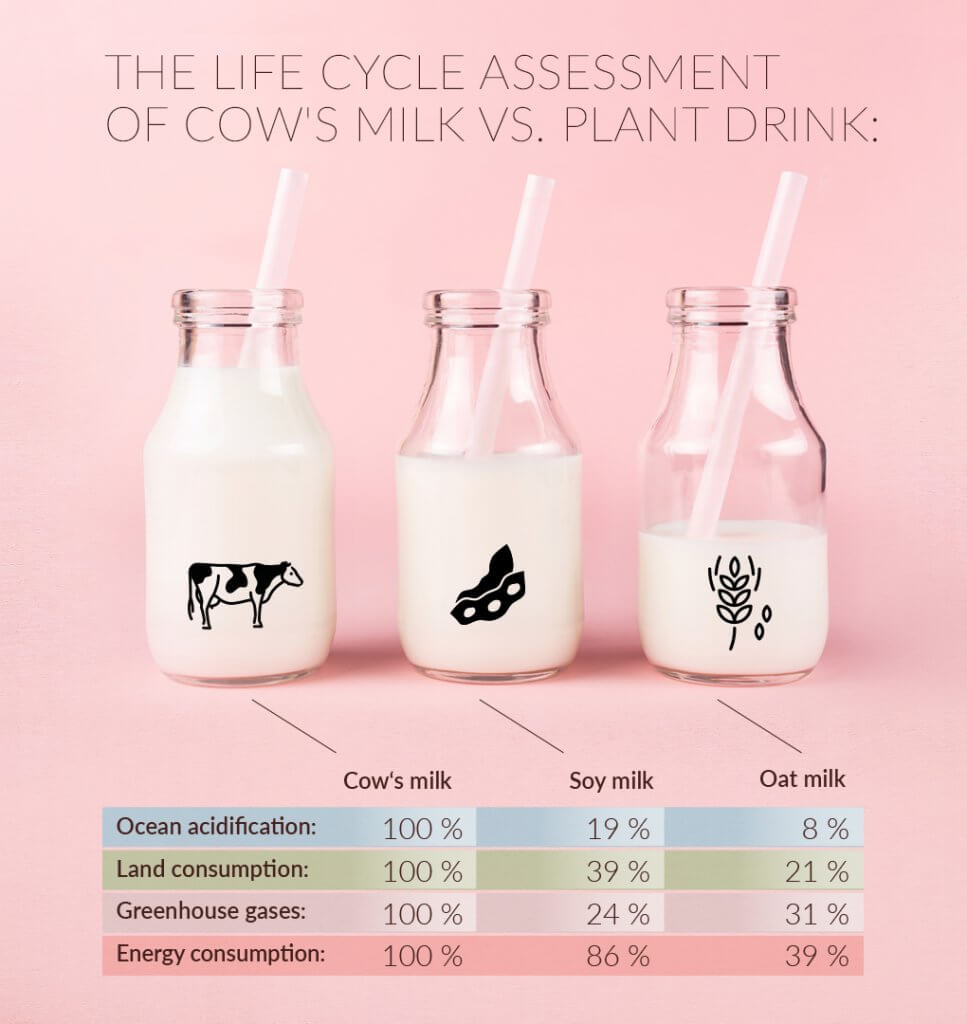
Soy milk, on the other hand, has a lower content of unhealthy saturated fatty acids, contains no cholesterol, but also hardly any vitamin A or B. The protein content is very similar, as is the biological availability.
However, there are now many different milk alternatives with individual strengths and weaknesses, which is why it is difficult to draw a clear conclusion. The best thing to do is to adjust your milk (substitute) consumption to your individual needs and change the alternatives regularly to enjoy all the benefits.
- #Bio-Frühstück
- #kuhmilch
- #pflanzendrink
- #pflanzenmilch
- #pflanzliche Lebensmittel
- #Verival

